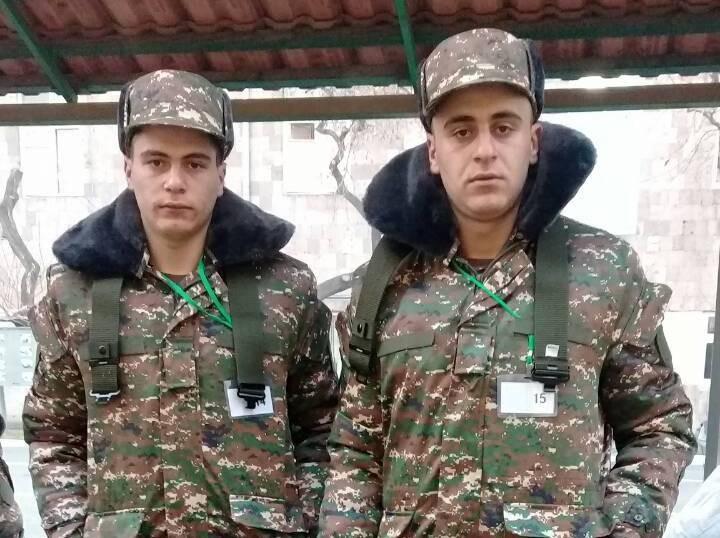
Armen Geghamyan: "I'd return to the battlefield if it weren't for the loss of my brother"
By Lilit Khlghatyan
A black ribbon is attached to the entrance arches of Litchk village in Armenia’s Gegharkunik Province, with the words "Arsen 19" written on it.
On the way to Arsen’s house, I’m greeted by his cousin Susanna. We go up to the second floor of the house. She says that there are a lot of people inside, they will interrupt our conversation.
It is dark in the room. The light bulb is broken. They haven't gotten around to changing it.
Arsen's twin brother, Armen, enters. He was wounded in Artsakh. He approaches, says hello, sits opposite me, then instructs them to change the bulb. I notice the icons in the lighted room. Susanna takes a bunch of candles and lights them in front of the icons. She says she’s been lighting a candle every day since the war began and praying that this nightmare will soon end.
Armen is a tall, handsome boy, 19 years old, but has seen and experienced much for his young age.
Armen and Arsen Geghamyan served in a military unit in the south of Artsakh, driving a military vehicle during the war.
"We were woken up early on Sunday morning. The commander suddenly shouted, Diversionary unit, hide.' We thought it was a training exercise, but we looked up and saw that there were flying devices overhead. Our air defense hit seven of them. We took the weapons and moved to the south of Artsakh," Armen starts telling me.
There was a bout of intensive fighting. The order then came to move. It was October 10. Armen drove the vehicle.
"The area we were passing through was flat land, and if the enemy targeted us, there was no hiding place to enter, no mountains. There were four people in the back of the vehicle with me. I was up front with the artillery commander. Concerned about the guys, I floored the vehicle to a speed of 100km per hour,” Armen continues.
When they reach their destination, the enemy attacked, injuring Armen.
"A shrieking sound was heard and fell directly on a nearby vehicle. I was injured. Many of the guys were caught in the flames and burned. One had his leg broken, another his arm. I was able to help some people by breaking the door and pulling them out of the fire," he says.
The fragmentary shell was followed by a Smerch rocket attack. It was then that Arsen came to help his brother Armen.
"They fired a Smerch, but luckily for me, it fell but did not explode," Armen says, recalling the October 10 events.
With the help of his brother, Armen reached Stepanakert where he received first aid. Days passed. Armen waited for days to recover and return to the battlefield to his brother and their comrades-in-arms.
Everything turned upside down on October 14.
"On that ill-fated day I got a call from the village saying there are rumors that my brother's vehicle was blown up and he was left inside. I call the guys. None of them know anything. Later, I learn there are victims and wounded. "
Armen asks to be told the names of the dead and wounded. His brother's name is not on the list of the wounded.
"It turns out that the enemy fired a Smerch and a cluster bomb. The commander called and said, ‘I'm sorry.’"
Armen does not talk much about what he’s feeling. He says that the news shocked him. He walks with unsteady steps. His nerves are at the breaking point.
A few days ago, Armen was issued compassionate discharge from the army as the only surviving male child in the house.
We deviate a little from the topic of conversation. He says that there were happy moments on the battlefield, despite the danger.
I ask where our soldiers get their inner strength from.
"When you think that the life of so many depends on you, when you can save the lives many people, you definitely don’t tire," Armen says adding that he would have liked to return to the battlefield if not for the loss of his brother…
Top photo (from left): Armen Geghamyan, Arsen Geghamyan
(Lilit Khlghatyan is a third-year student at Yerevan State University’s Faculty of Journalism)
 Videos
Videos Photos
Photos
Write a comment